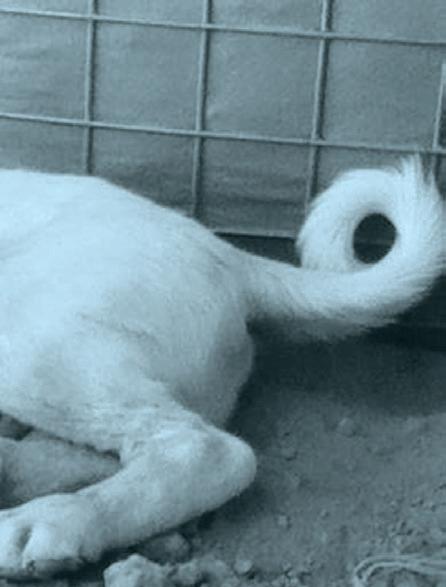
10 minute read
snake, rattle and roll 6 / demon dog
Just a heads up. If you’re the kind of person who cries every time you hear “Old Shep,” you might not make it through this story.
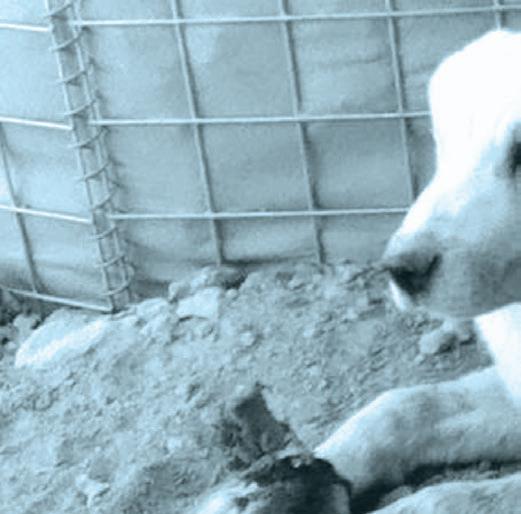
Advertisement
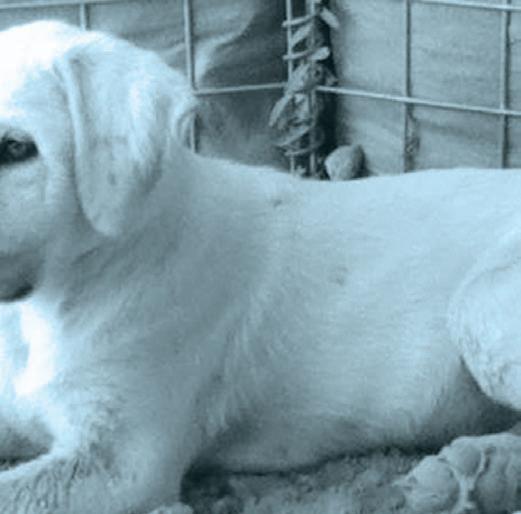

Demon DoG

Ihad a pet for only 14 days once. He was a small white puppy with a curly tail that looked like it belonged to a pig. His name was Demon, and he sure lived up to his namesake. In those 14 days, I awoke numerous times to frantic footsteps and people shouting “Demon!” at the top of their lungs. He liked to steal socks.
Demon’s home was a god-forsaken outpost in the middle of nowhere Afghanistan. The Army called it a
“joint security station.” Delta Company, First Battalion 504th, built the outpost in early 2012. They were the ones who found Demon and named him after their company mascot.
Military general order 1A specifically prohibits “adopting as pets or mascots, caring for, or feeding any type of domestic or wild animal.” No one at the JSS cared. One advantage to being in the middle of nowhere is the people who enforce those kind of rules tend to avoid it.
The Army isn’t wrong to worry about soldiers keeping pets. Rabies is common among the roaming packs of wild dogs in Afghanistan. If contracted by humans, it’s almost always fatal following the onset of clinical signs.
When I arrived at the JSS, in August 2012, the story being passed around was that the previous battalion had brought in a veterinarian to vaccinate Demon. They also said Demon found two IEDs for them. I didn’t believe either of those stories, but it was sure nice to have a dog running around.
Demon’s favorite game was stealing gear from someone and forcing that person to chase him around. This caused moon dust—extremely fine sand that coated the JSS—to billow and shroud the outpost in hazy brown. A couple of times I woke up to find he had procured an extra knee pad and placed it under my cot.
Demon didn’t just play games. In the 15 days I spent at the JSS, Demon went on a majority of the patrols. I remember one early August morning, hours before the sun came up, we left to patrol the local villages—12 soldiers in a staggered column walking down a dusty road and one tiny mutt running in circles around them.
I was toward the rear, so I kept my eye out for Demon. Early on, we passed a couple of wild dogs and Demon sprang into action. He sprinted towards the wild dogs barking as ferociously as he could. The wild dogs scattered, and Demon ran back to me. For the next mile or so, he regularly looked back to make sure none of them followed us.
As the sun began to rise, we stopped in a small village. Soon after, the villagers came to the mosque for Morning Prayer. One of them brought his goats. Demon decided he was going to see if he was part shepherd. He ran up to the herd and all but one backed away. One goat, with a large set of horns stepped up to Demon. Demon looked at us, as if to say, “You guys have my back, right?”
“That dog is about to learn an important lesson,” someone said.
The goat slammed his horns into Demon’s head. Demon yelped and ran back to where I was set up. I saw he was trembling so I gave him a few reassuring pats. When it was time to leave, he was so scared I had to carry him out of the village.
After 13 days at the JSS, everyone was exhausted. We got to sleep four hours at a time in between guard shifts and patrols. Our uniforms were caked in mud and sweat. When the company sent a resupply element, the company commander came with them.
The evening of my 14th day, I was lying in my cot when I heard a chorus of groans erupt. I got up and saw the company commander marching towards a field outside the camp with his pistol drawn. Following him was one of the radio operators, cradling Demon in his arms. Neither of them looked at us.
I didn’t see what happened next, but I heard the shot. Then Demon start wailing, the kind of high pitched scream a dog does when you step on its tail, except it kept going.
It went on long enough for someone to shout, “What the fuck are you waiting for?” I clamped my hands down on my ears, trying to muffle the sound. Then I heard the second shot. As the commander walked back through our camp, the whole platoon just stared in silence.
Once he was gone, I shouted at the sky. I paced around in the moon dust. I kicked a bottle of water across the camp and pounded my fist into a wall. Guys in my platoon would later tell me that it was the maddest they ever saw me. They were probably right.
The commander left Demon’s body lying in the ditch where he shot him. So a couple of guys went out to dig a grave for him. They fashioned a cross out of some spare lumber and engraved in sharpie: “Here lies Demon. Murdered by A6,” our commander’s call sign. Then someone nailed a sock to it.
In the 14 days I knew Demon, he became a part of our platoon. He walked with us on patrol. He played stupid games with us when we were bored. He was our pet and, for a little while at least, he made that far flung shit hole in the middle of nowhere a little bit like home. Ω
Demon’s favorite game was stealing gear from someone and forcing that person to chase him around. … A couple of times I woke up to find he had procured an extra knee pad and placed it under my cot.
OveR the moon
CockadoodleMoo is a sanctuary that takes farm animals out of the food chain Story and photos by Jeri Chadwell-Singley
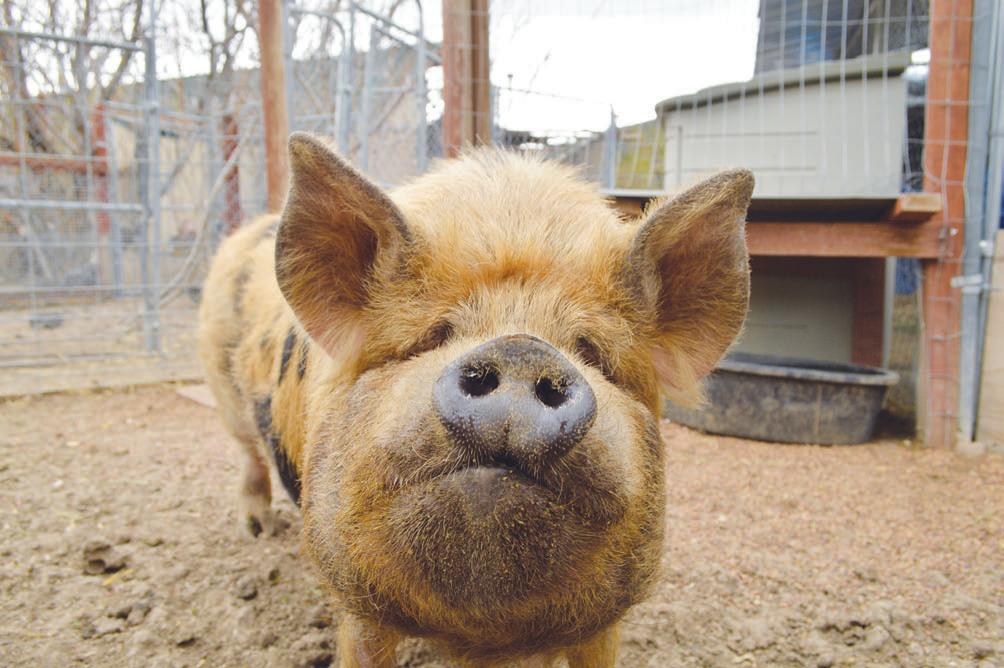
Left: mark robison feeds Willa the donkey. right: Liam is one of several pigs at Cockadoodlemoo. “n obody’s gonna hurt you,” Mark Robison cooed to the turkey that rested in his lap as he sat on the ground of the pen. The wind whipped through the little valley northeast of Reno where Robison’s home and his farm animal rescue, CockadoodleMoo, are located—ruffling the turkey’s feathers and carrying with it the scent of the coming rain.
CockadoodleMoo was founded in 2007 by Robison and his wife, Dianne, but the couple’s move to the remote property in the foothills of the Pah Rah mountain range came earlier. While the sanctuary is now home to turkeys, chickens, donkeys, goats, pigs, rabbits, cats, dogs and desert tortoises—plus unofficial denizens like squirrels, birds and mice—the whole thing actually started with just one noisy pet—a barking dog named Harper Lee.
The Robisons were both working nights at the Reno Gazette-Journal when one of their two dogs passed away. Afterward, the remaining dog—Harper Lee—picked up the habit of barking continuously through the night, annoying the neighbors and leading to a visit from animal control, which in turn led the Robisons to look into ways of keeping their dog quiet.
“At the time, it was very popular to cut their vocal chords, and then there’s also the things where there’s like a shock collar that shocks them every time they bark,” Robison said. “We just hated all of the solutions, and we didn’t want to lock her in the garage. So, we decided that her happiness was important and barking was part of who she was. We moved out here so that she could be free to be herself and bark all she wanted.”
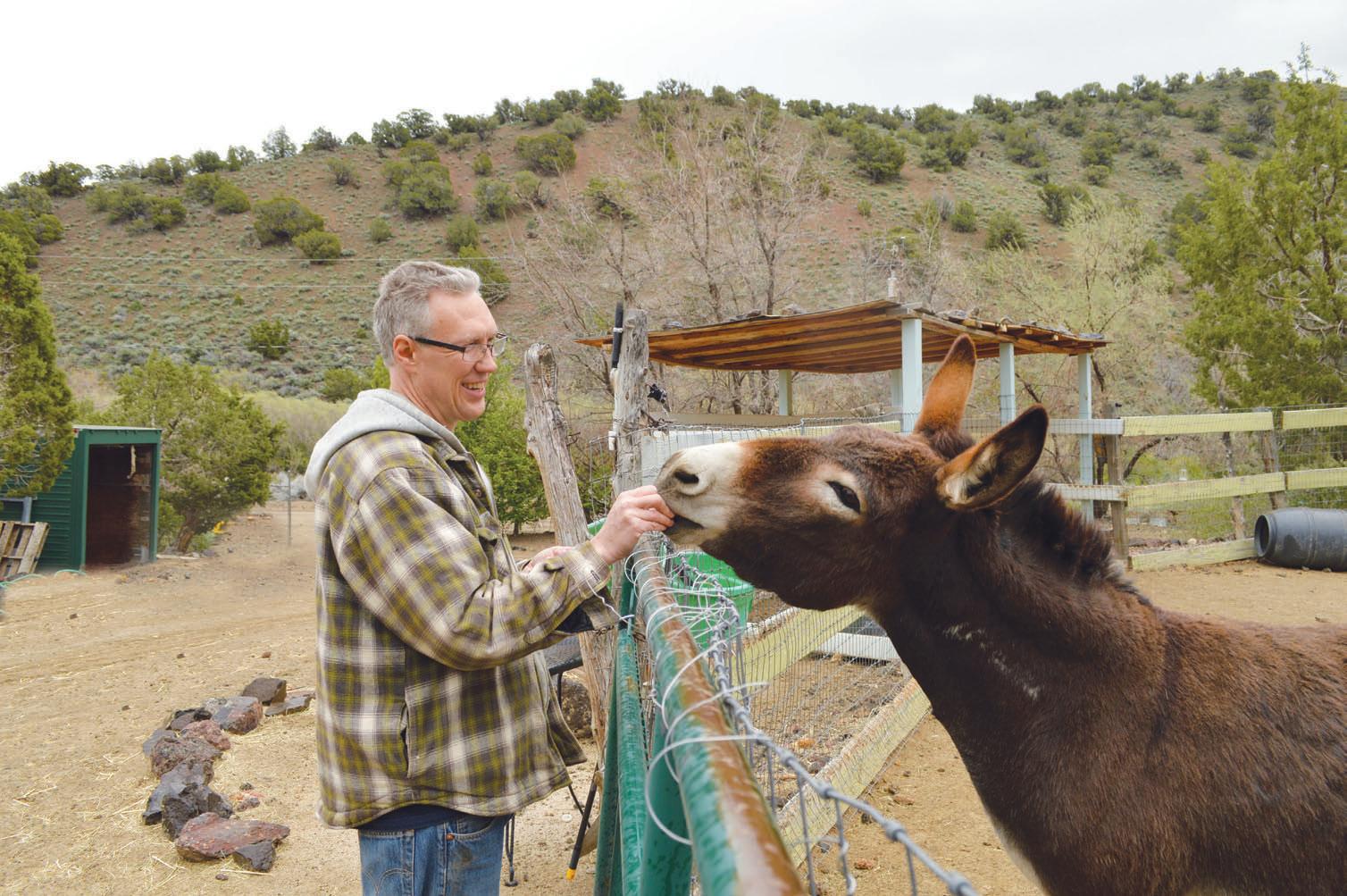
Betting the farm
The Robisons new home was not only distant from the city in a valley accessible by a single lane dirt road, it was also spacious, offering them 168 acres of land. “This is the type of place that you envision retiring to, where you’re out in the country, and it’s beautiful, and you can hike in the mountains with your dogs every day,” Robison said.
The Robisons, longtime vegans and animal rights activists, had found themselves living in their dream retirement home decades early, and they saw a new opportunity in the large plot of land they’d purchased to accommodate Harper Lee. They were inspired by the Nevada Humane Society’s adoption of a “no kill” policy and decided that they too wanted to provide a home for unwanted and abused animals.
“We looked at rescuing dogs, and there were already a lot of dog rescue groups, and we happened to read this book called The Pig Who Sang to the Moon by Jeffrey Masson,” Robison said. “It was about what the lives of farm animals would be if they weren’t kept on a farm to be raised for meat and dairy. And, you know, what sort of things they’d do—like the turkeys roost in trees, and the goats like to climb stuff, and the chickens like to take dust baths.”
The couple got busy constructing pens and shelters on their land and, shortly thereafter, put out word to animal services and the Humane Society. It wasn’t long before they began receiving animals.
“One of the first animals we got was a goat named Festus, and he was just picked up as a stray wandering down the highway,” Robison recalled. “He had nerve damage in his back legs, and so he couldn’t walk and they thought he was really old and only had a few months to live. So they asked if we could take him. We ended up having him for seven years. And he was great.”
Many of the other animals at the rescue also arrived there after having lived a tough life. Robison explained that the turkeys are females who came to the rescue from a farm where their lives had consisted of repeated artificial insemination for the purpose of breeding Thanksgiving turkeys. CockadoodleMoo is also home to former organic egg farm chickens that, according to Robison, would otherwise have been killed when their egg production slowed as they neared 1 year of age. Other chickens, he said, have arrived featherless, suffering from malnutrition after their owners became too old to care for them. And yet another chicken came to the rescue after being tossed off a balcony onto the casino floor of the Atlantis, purportedly by members of a University of Nevada, Reno fraternity.
“The animals that come to us—we try to only take the worst of the worst who are going to be killed if we don’t take them or who nobody wants, because they’re injured or sick or too old,” Robison said. “They’re of no value to anybody, so they face certain death.”
According to Robison, CockadoodleMoo currently has about 75 animals, which is just about as many as it can handle. Though he’ll take the occasional chicken, roosters—which are the animals he’s most often asked to take—are a trickier matter, as they don’t get along with one another and so require separate living spaces. And animals arriving at CockadoodleMoo are there to stay. The Robisons don’t put them up for adoption, partially because they don’t have the resources to vet potential adopters, but also because of the stress it would place on the animals.
“Moving for an animal is really traumatic and stressful, because they don’t know what’s going on, and they’re very used to their routines,” Robison said. “We don’t want to put them through that again.”
According to Robison, CockadoodleMoo is a permanent home for him and his wife also, and they’re still happy with the initial decision that began with a barking dog and ended with more than six dozen permanent farm animal residents.
“It’s all about taking care of the animals, because when you see how happy they are, and when they just become so content that they’ll sprawl out in front of you in the sun, you know that you’ve given them a good life, and that things are much better than they used to be,” he said. Ω



